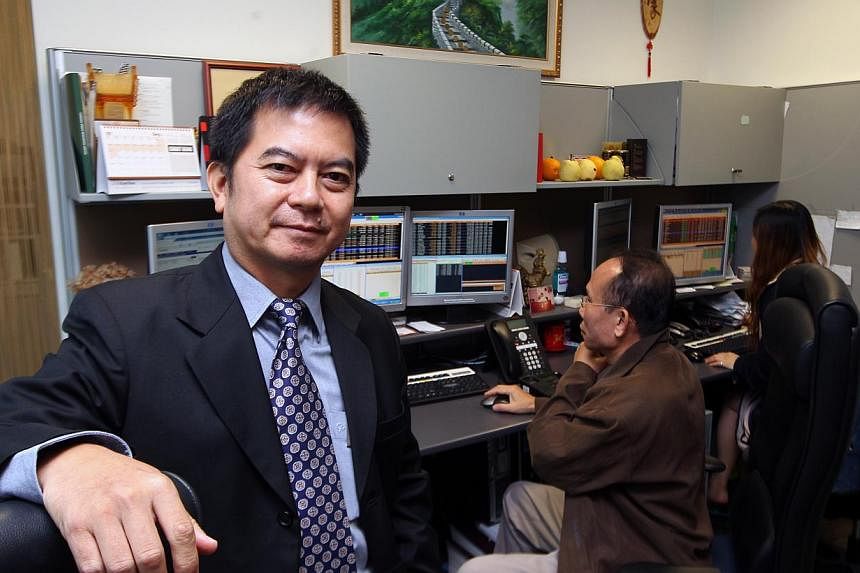SINGAPORE remisier Jimmy Ho remembers the good old days of stock trading when the action came thick and fast and the cash was free-flowing.
"It was very good. You'd answer the phone with your left ear until it became heated and you would have to change to your right ear," said Mr Ho, as he reminisced about the early days of his 20-year career.
"For some remisiers, they could do $100,000 a month in commissions during a bull run."
These days, remisiers like Mr Ho, who is also the president of the Society of Remisiers (Singapore), have a quieter existence, tapping away at the keyboard while monitoring the stock market on multiple screens.
A few times a day, a client calls for help with trades but most deals are done with a click of a button by the clients themselves.
The cash has also dried up, said Mr Ho. "I don't have the exact figures, but my estimation is that more than half of the remisiers earn less than $1,000 (a month, in commissions) nowadays."
The sharp slowdown in business these days is partly due to the World Cup and June school holidays, which bring down volumes on the market.
"Trading activity was low before, but now with the World Cup, it's lower than low," he mused.
Another reason for the slowdown has been the fallout from the penny stock crash.
Penny stocks, which are cheap to buy, used to be a good source of revenue as many small-time punters would do quick trades, resulting in higher volumes and commissions for remisiers.
But after Blumont Group, LionGold Corp and Asiasons Capital rose to record highs before crashing spectacularly last October, retail investors have shied away from such counters.
In turn, commissions earned by brokers have dropped by between 15 per cent and 40 per cent, brokers told The Straits Times.
The industry has been on a long and steady decline, battered by regulatory changes, technological advances and rising competition.
Five years ago, the daily average turnover in May 2009 was $2.27 billion.
Today, the local market's daily average securities turnover is just half of that, standing at $1.17 billion last month.
Changes in regulation have also hit remisiers hard. In December 1999, the Singapore Exchange (SGX) was formed by the merger of the Stock Exchange of Singapore, Singapore International Monetary Exchange, and Securities Clearing and Computer Services.
That came alongside a raft of changes which increased competition in the stockbroking industry and saw commissions slashed.
The changes were good for investors but very bad for remisiers.
Commissions for a remisier are now as low as $10 for an online trade, after deducting the cut to the brokerage firm.
This means brokers will need their clients to make 100 online trades a month to hit the $1,000 mark. But activity has dropped off so much that many struggle to hit that target, said remisiers.
New forms of trading products and services from non-conventional brokers are also making the landscape more competitive.
The growth of contracts for difference has also taken business away from remisiers.
These investment tools provide traders with a quick and easy way to take bets on the direction of the stock without needing to put a large amount of capital down.
Some remisiers still try to set themselves apart, with the trading advice and ideas they provide to their clients.
But some investors - particularly younger ones - prefer to trade and invest by themselves, without the input of their brokers, said remisiers.
It is no wonder Mr Ho feels the future is bleak, with fewer young remisiers joining the industry.
"When they see the situation is like this, the fresh graduates stay away," he said.
Brokers such as Mr Desmond Leong, with about 10 years in the trade, are now turning to trading their own money as means to support themselves and to rely less on commissions.
"The clients aren't providing a lot of brokerage (fees), I've got to bump up my own trading. That's the reality for a lot of the remisiers," said the 35-year-old.
Proposed changes from regulators, who want to stop a practice which allows investors to trade shares without putting up actual capital, could lead to further repercussions.
The end could be near for unsecured "contra trading", which will reduce the credit risk for remisiers - but also further dampen trading activity.
Some brokers are not sticking around to find out.
"A number of remisiers have quit the industry," said 26-year- old Alvin Yong, who has been in the business for three years and is one of the few young faces in the trading room.
Also, a major bugbear among remisiers is the dropping of a midday break by SGX, which was initiated in 2011.
Said Mr Yong: "Who wants to go into a job with no lunch break?"

